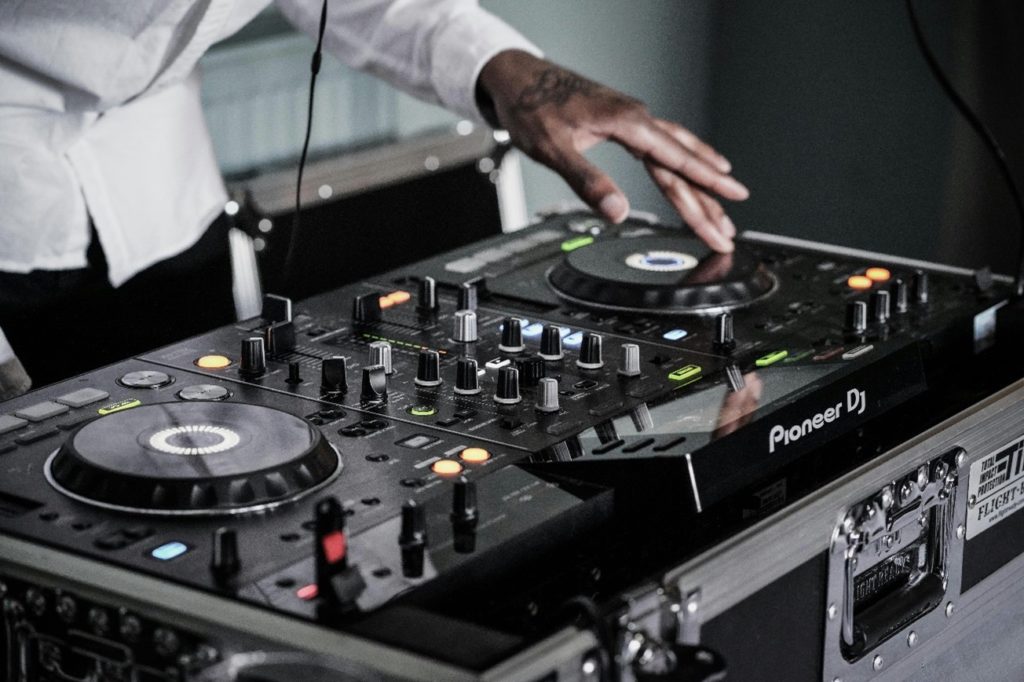
Why do certain occupations continue to cherish and rely on age-old tools and techniques, even amidst the prevailing trend of modern technology phasing out traditional skillsets and equipment? How does this relate to how the past is remembered through material artifacts and embodied practices within various occupations? These were some of the questions that motivated our study, recently published in the Journal of Management Studies to examine the intricate interplay between materiality, memory, and occupation using electronic music DJs as a case study.
Digital revolutions in DJing
Electronic music DJing involves creatively performing electronic dance music and producing original music for clubs and festivals, which is often played digitally. Technological advancements have revolutionized DJing, with digital formats and automated features having the capacity to replace manual processes. Contemporary DJ equipment allows for in-play manipulation, beatmatching, looping, and creative effects, making music production more accessible, but the influence of the past is still strong in this occupation. Historically, DJs played vinyl records, creatively mixing them together to build energy on the dance floor through beatmatching and blending music seamlessly. The early history of DJing, its equipment, and sound-systems are important aspects of storytelling within the occupation, with efforts to preserve dance music history and replicate the atmosphere of past eras in events and parties. It is these attributes that make this case so apposite for our investigations. But why does modern digital DJ equipment still resemble ‘old-skool’ vinyl turntables? Why is there such a disdain for the techniques of digital performance among long-standing electronic music DJs who revere the vinyl formats of the past? How do new DJs learn the ropes of their occupation given history’s ever-present shadow? Through these puzzles we show how DJs can be thought of as a mnemonic community.
The value of ‘the ways we used to do things’
Specifically, we investigate how newer DJs engage with their technologies to maintain a sense of connection to the past and in so-doing establish membership in the DJing community. We generated our data through interviews with 73 DJs and an eight-year autoethnography by Samantha, one of the authors of the paper and also a DJ. The findings suggest that despite the advantages of newer technologies in terms of ease of use, cost-effectiveness, and portability, many newer DJs nonetheless invest time and effort in learning older technologies and mastering traditional DJing skills. In particular, we found that DJs attribute value to older technologies based on their emotional and embodied connection to the occupation’s history.
When DJs value past technologies, they engage with them as ‘material-relational mnemonic devices’, imagining affinity with earlier DJs who used similar technology. This relationality extends to newer DJs’ beliefs about the superiority of old technologies, shaping the politics of technology engagement within the DJ community. Aligning with past technologies is seen as a political choice that facilitates acknowledgment from peers and situates DJs within professional hierarchies. Additionally, DJs’ performative use of technology, such as displaying skills associated with older technologies, serves as a complementary process for maintaining mnemonic communities. These performative practices signal DJs’ connection to past technologies and their understanding of their significance, fostering relational affinities within the community. Overall, these shared interpretations and performative practices contribute to maintaining mnemonic communities by integrating new entrants and reinforcing collective understandings of the past.
Community through technology as a ‘mnemonic device’
What our study suggests, then, is that technology can serve as a ‘mnemonic device’ that newer entrants to an occupation use to navigate their identities and membership within the occupational community. So while previous research has focused on incorporating newcomers into mnemonic communities through storytelling or historicizing (usually in words or text), this study highlights the entanglement of materiality and social context in mnemonic processes, emphasizing how technology evolves over time and shapes occupational groups’ engagement with the past. By focusing on technology as a relational mnemonic device, the study offers insights into how occupational boundaries are formed and maintained. In academic terms, these ideas have theoretical implications offering a novel conceptualization of “occupational mnemonic communities.” These communities emerge based on shared interpretations of past technologies, shaping norms of authenticity and legitimacy within the occupation. The study also underscores the political nature of mnemonic processes, which influence how individuals remember and contribute to occupational hierarchies.
While DJing is quite an unusual occupation, and further research in other contexts would help develop our findings, our findings show that solely learning a new technology may not be sufficient for gaining esteem in a profession. New hires may also need to maintain a good understanding of how things ‘used to be done’, to signal their versatility and authenticity. But reassuringly, as many workers grapple with how new technologies, such as AI will impact their occupations, our research findings also show how future workers should still be able to maintain their identities and a sense of belonging through leveraging their current knowledge – understandings of past technologies will always be useful no matter the pace of technological change.

0 Comments